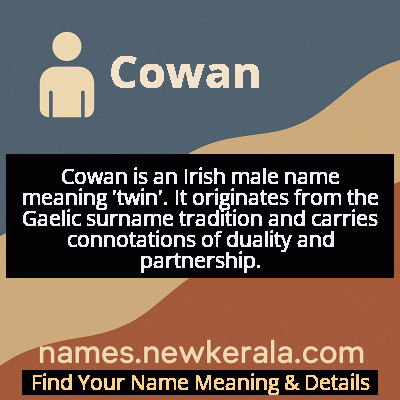Cowan Name Meaning & Details
Origin, Popularity, Numerology Analysis & Name Meaning of Cowan
Discover the origin, meaning, and cultural significance of the name COWAN. Delve into its historical roots and explore the lasting impact it has had on communities and traditions.
Name
Cowan
Gender
Male
Origin
Irish
Lucky Number
2
Meaning of the Name - Cowan
Cowan is an Irish male name meaning 'twin'. It originates from the Gaelic surname tradition and carries connotations of duality and partnership.
Cowan - Complete Numerology Analysis
Your Numerology Number
Based on Pythagorean Numerology System
Ruling Planet
Moon
Positive Nature
Diplomatic, friendly, artistic, empathetic.
Negative Traits
Over-sensitive, moody, indecisive, prone to self-pity.
Lucky Colours
Green, cream, white.
Lucky Days
Monday.
Lucky Stones
Pearl, moonstone.
Harmony Numbers
1, 3, 4.
Best Suited Professions
Diplomats, mediators, caregivers, artists.
What People Like About You
Cooperative spirit, friendliness, artistic talent.
Famous People Named Cowan
John Cowan
Musician
Bassist and vocalist for the New Grass Revival band, pioneering progressive bluegrass music
William Cowan
Military Officer
Scottish recipient of the Victoria Cross for bravery during the Indian Mutiny of 1857
Robert Cowan
Politician
Lord Provost of Glasgow and prominent Scottish political figure
Andrew Cowan
Rally Driver
Scottish rally driver who won multiple international competitions including the London to Sydney Marathon
Name Variations & International Equivalents
Click on blue names to explore their detailed meanings. Gray names with will be available soon.
Cultural & Historical Significance
The cultural impact of the Cowan name extends beyond genealogy into the realms of literature, politics, and arts. In Ireland, the name is woven into the fabric of local histories and community narratives, while in Scotland it's recognized as part of the rich tapestry of Scottish clan history. The diaspora communities maintained the name as a connection to their Celtic roots, often using it as a marker of cultural identity. Today, the name continues to symbolize the enduring connection between Ireland and Scotland, representing the shared history and cultural exchange between these two Celtic nations.
Extended Personality Analysis
Individuals named Cowan are often perceived as possessing a dual nature that reflects the name's meaning of 'twin' - they tend to be adaptable and versatile, capable of balancing different aspects of their personality effectively. Typically, Cowans are known for their practical intelligence, strong work ethic, and reliability, making them valued members of any community or organization. They often exhibit a quiet confidence and determination, approaching challenges with methodical precision rather than impulsive action. Many Cowans demonstrate excellent problem-solving skills and show particular aptitude in hands-on professions or technical fields.
Beyond their practical abilities, those named Cowan often display strong interpersonal skills and emotional intelligence, allowing them to navigate complex social situations with grace. They tend to be loyal friends and partners, valuing deep connections over superficial relationships. Their inherent duality allows them to understand multiple perspectives, making them excellent mediators and team players. While they may appear reserved initially, Cowans often reveal a warm, humorous side to those they trust. This combination of practicality and emotional depth creates individuals who are both grounded and insightful, capable of building strong foundations in both their personal and professional lives.
Modern Usage & Popularity
In contemporary times, Cowan continues to be used primarily as a surname, though it has seen occasional use as a first name, particularly in Ireland, Scotland, and among diaspora communities. The name maintains moderate popularity in Northern Ireland and Scottish regions, while in North America it's more commonly found as a surname. Recent genealogy trends have sparked renewed interest in the name, with some parents choosing Cowan as a first name to honor family heritage. While not among the most popular names statistically, it holds steady usage among families with Irish and Scottish ancestry who value traditional Celtic names with meaningful origins. The name has also gained some traction in artistic and creative circles, where unique heritage names are increasingly appreciated.
Symbolic & Spiritual Meanings
Symbolically, Cowan represents duality, partnership, and complementary forces - reflecting its core meaning of 'twin'. The name embodies the concept of balance between tradition and progress, intuition and logic, independence and community. In Celtic symbolism, it connects to the idea of mirrored souls or complementary energies working in harmony. The name also carries connotations of craftsmanship and building, symbolizing the ability to construct lasting legacies through skill and dedication. As a surname-turned-first-name, it represents the bridging of past and future generations, honoring ancestry while moving forward. The symbolic resonance extends to themes of unity in diversity and the strength found in balanced partnerships.

